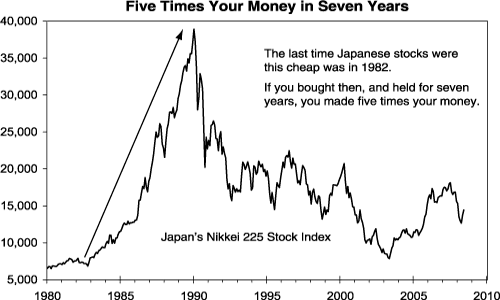| Home | About Us | Resources | Archive | Free Reports | Market Window |
Cheapest in a Quarter-Century!By
Friday, June 27, 2008
The headline to the new issue of True Wealth is: The Next Big Thing(s) – Nine ideas for a difficult market. I expect a few of these nine ideas will turn out to be life changing investments, as I mentioned earlier this week inDailyWealth. The core premise of the nine ideas is this: A new mega-bull market is about to emerge... in something. Typically, in new bull markets, the themes that worked the last time around don't work anymore... Instead, new themes take over. Sectors of stocks that have done nothing for years start rising, for no apparent reason. The thing is, nothing is emerging yet. If it ain't energy (the "old" theme), it ain't working. We've taken stabs at a few things outside of energy... only to prove what we should already have known: It's too early at this point – and therefore too dangerous – to try to "guess" who the new bull-market leaders will be. As low-risk investors, we'd rather not catch a falling knife. We should let it hit the ground and bounce around a bit before we pick it up. One interesting "falling knife" is Japan... Today, Japanese stocks are cheaper than they've been at any time in the last quarter-century... You have to go back to the beginning of 1983 to find price-to-earnings ratios and price-to-book values this low... and dividend yields this high. If you were bold enough to buy Japanese stocks at the beginning of 1983, and hold them for seven years, you'd have made five times your money... The Nikkei – Japan's main stock index – started 1983 at 8,000 and closed 1989 near 39,000. Just to give you an idea of what that means, consider the Dow Jones Average in the States... Today it's around 12,000. Can you imagine it rising to just under 60,000 in seven years? That's how much Japanese stocks moved starting in 1983, the last time they were this cheap.
Of course, Japan was undergoing an extraordinary transformation at the time. And it had to pay for that spectacular move higher... It's now nearly 20 years after the peak. And the market is still down more than 50%! The Nikkei bottomed most recently at around 12,000 in mid-March. Today it's closer to 14,000. So we might just be seeing the start of an uptrend here... When you size it up under our True Wealth lens, Japan is: 1) The cheapest it's been in over a quarter-century. Bold speculators could step in today. A broad-market index fund for Japan (like EWJ) is the simplest way to go. Smaller stocks are even cheaper than the ones in the broad index. But speculators could get burned now...
Someday soon, we'll be buying Japanese stocks. Good investing, Steve P.S. We're so excited about the long-term prospects for these ultra-cheap Japanese stocks, we're actually looking to start a Japanese investment newsletter... We've already set up the backbone of our newsletter business in Japan. Butwe haven't found the right Japan-based editor. It's tough... The editor needs to speak Japanese and English... needs to be extremely knowledgeable about investing and Japanese stocks... but importantly, he or she must be able to communicate in plain language, so "Mrs. Watanabe" can easily understand it. If you are this person, or know someone who might be, please contact us at: [email protected].
Further Reading:
Someone Will Make a Lot of Money on This Market Anomaly Market NotesA SERIOUS NEW ALERT ON AMERICAN CREDIT Grave news from yesterday's trading (news you won't hear on CNN or read in the paper): One of America's largest credit-card companies, Capital One, is plunging right now. We generally avoid making "credit calls" in these pages. Thousands of smart analysts have called for the demise of the American consumer for decades... and they've been wrong for decades. Still, we can't ignore what the market thinks of Capital One right now... Capital One's closing price broke through its January low. Declines come on huge trading volume. Rallies come on weak volume. The charts of American Express, Freddie Mac, and Fannie Mae tell the same story. These four stocks are among the pillars of American credit. They are "on the hook" for a staggering amount of the country's mortgage and credit-card debt. The market is not just marking them down, it is hammering them. It's saying, "I think a good chunk of that money you've loaned out isn't going to be paid back. You might be screwed." |
Recent Articles
|


